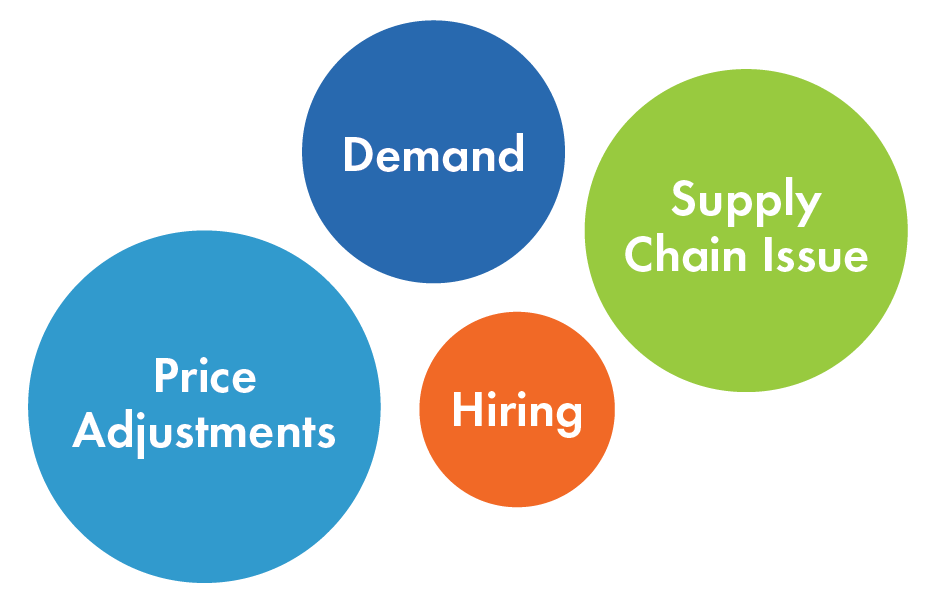
It’s safe to say that recent years have brought unprecedented challenges – the last thing small businesses want to think about is the likelihood of a recession. Unfortunately, with the economy contracting, the highest level of inflation in decades and an extremely volatile housing market – a recession is likely already underway.
What is a recession?
A recession is a period of significant decline in economic activity across the labor market, consumer and business spending, industrial production, and incomes. It usually lasts more than a few months. Recessions create significant hardship on households and businesses, and they can have long-lasting effects on both society and the economy.
How does a recession impact small business?
A recession can impact nearly every business and industry, and small businesses are especially at risk.
Demand
In times of recession, demand for your product or service may decline. This can vary by sector and geography, but in general, reduce your sales and revenue.
Hiring
In the last year, hiring employees has been a challenge for all businesses. High demand for employees means businesses have had to offer higher wages and better benefits. Small businesses have had to spend more to attract and keep workers, which takes a toll on their bottom lines. However, a recession generally leads to layoffs, which could mean a larger pool of workers for small businesses to source from.
Supply chain issues
The COVID-19 pandemic has contributed to widespread supply chain issues, leading to cash flow issues for businesses. Paying more for materials and items, dealing with shortages, and missing the products or services needed to keep business moving is difficult for small businesses to handle. This will likely continue over the next few months and make a potential recession even more challenging.
Price adjustments
Increased labor wages, inflation, higher gas prices, and supply chain issues mean many small businesses have been forced to raise prices to maintain a favorable profit margin. Higher prices coupled with a recession could be extremely detrimental to small businesses as they’ll be unable to lower prices at the rate of larger companies should a recession hit. As consumers have less to spend, they may turn away from the “premiums” of small businesses in favor of corporate giants who have more control over pricing flexibility.
Small businesses are equipped to survive a recession
While the challenges of a recession are considerable, small businesses have all the tools to succeed – especially with the right plan in place.
Adjusted during the pandemic
Small businesses had to make the most adjustments during the pandemic—and they did it well. Those small businesses that have survived the last two years are uniquely positioned to take on new challenges, including a recession.
Small businesses have evolved
Because of the way small businesses have evolved throughout the pandemic—adopting new systems, taking some of their business online, and diversifying their product and service offerings—they are in an even better place to tackle the challenges of a recession.
Recessions can create opportunities
Companies can make more dramatic gains or losses during downturns than during stable periods. While there is risk during recessions, opportunities are created by honing your strategy and operations to perform well during the downturn, and when the tide changes you can perform much better.
People are still spending
Right now, people are still spending. The last few years have put a large focus on the importance of supporting small businesses, so consumers are shopping small and spending locally.
How to recession-proof your small business
It’s important to be realistic and get a plan in place now to recession-proof your business.
Be customer-centric
When consumers have less to spend, they’re usually pickier on what they buy—and who they buy it from. By identifying key customer needs and ensuring you can meet those needs, you can remain top of mind with consumers even during a recession.
Create a personalised experience
Shoppers seek personalised experiences and small businesses have a unique opportunity to create that. As a small business, you’re interacting and engaging with your customers every day. You can connect with them, understand what they’re looking for, and offer it to them.
Manage your cash flow and cut unneeded costs
- Understand your costs and profit margins
- Get creative about how you’re spending
- Find processes that can be streamlined and automated
- Search for other suppliers
- Stock up on products now
- Cut unnecessary subscriptions, services, and products
Don’t cut marketing costs—just adjust your strategy
When a recession hits, many small businesses feel like they need to completely cut their marketing budgets. But the reality of doing this is more detrimental to your business than you might think. Rather than completely cutting your marketing costs, simply tweak your strategy so you’re focusing spending on the marketing tactics that will help you meet your goals during a recession.
Strategically look for growth opportunities
Recessions offer great opportunities. Having some focused bets during these tough times can pay off handsomely as the economy improves.
Start recession-proofing your small business now
By making some adjustments and staying agile, you can keep your business running effectively and even grow during this challenging time. If you’re looking for a new strategy to shift your marketing efforts, we can help. We will get to know your business and understand your goals. Contact us today to learn more.


